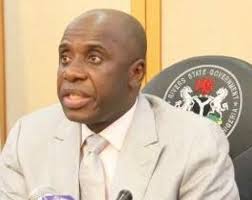THE Chairman of the House of Representatives Committee on Ports, Harbours and Waterways, Dr. Patrick Asadu, has decried the lack of investment in transportation infrastructure in the south eastern part of Nigeria.
Asadu also frowned at the neglect of the other modes of transport especially the inland waterways, in the Transport Ministry’s budgets and policy statements. The lawmaker made these remarks in reaction to the Minister of Transport, Mr. Rotimi Amaechi’s explanations on why the Ministry’s N213 billion 2017 budget was devoted to railway infrastructure alone, while only a paltry N4 billion was allocated to the inland waterways, and also why such railway projects would not extend to the south east zone of the country at all.
He wondered why a government that is promoting national peace and harmony and a multi-modal transport policy can concentrate all its investments to the near total exclusion of a geopolitical zone where a high percentage of the overall cargo are traded, or neglect the inland waterways that provide 28 out of the 36 states of Nigeria and the FCT with cheap, fast and secure means of transportation of bulk cargo, including containers, agricultural and mining products.
Asadu reminded the minister and the audience of the fact that the 1999 Constitution of the Federal Republic of Nigeria as amended, clearly makes it mandatory that both appointments to public offices and development of the country’s infrastructure must be spread evenly, so as to command national loyalty and that it is the non-adherence to this Federal Character principle as enshrined in the Nigerian Constitution that sometimes generates ethnic and regional tensions, agitations and even militias.
Ethnic and regional tensions Asadu, a three time member, representing Nsukka/Igbo-Eze South Federal Constituency of Enugu State made his remarks during the budget defence session by the Federal Ministry of Transportation and its agencies before the House of Representatives’ Joint Committees considering the Ministry’s 2017 budget estimates. The joint committee comprises those of Aviation, chaired by Hon. Nkiru Onyejeocha (Abia), Land Transport, Hon. Aminu Sani Isah, (Sokoto), Maritime Safety, Education and Administration, Hon. Mohammed Bago (Niger) and Ports, Harbours and Waterways, Dr. Pat Asadu (Enugu).
Asadu also lamented on the very low budget releases to the Ministry amounting to only 24 per cent, and why even the meager releases were not yet fully utilized. He, however, urged the Ministry to devote at least 10 per cent of its railway budget to the inland waterways sector and see the effect on movement of bulk cargo and improved safety on our roads, affirming that the long completed Onitsha River Port, and the other river ports in Baro, Niger State, Lokoja, Kogi State and Oguta, Imo State would be wasted if the ministry cannot fund the National Inland Waterways Authority, NIWA, to create navigable waterways to take cargo to and from these ports.
He disclosed that the Onitsha River Port is already wasting due to disuse since its completion in 2012. Disagreeing with the minister, he insisted that the Onitsha-River port had huge potentials considering the cargo loads to the South East which made this particular river port very viable, especially when the zone has been left out in the modern railway projects of government.
In his reaction, Transport Minister, Rotimi Amaechi, explained that the Ministry was expecting further releases in the 2016 budget that may take their overall budget releases to over 50 per cent before the financial year ends. He assured the members that the apparent neglect of the South East in the railway infrastructure was not the making of the present government as the projects were awarded by the previous governments of Late President Musa Yar Adua and that the President Muhammad Buhari government only accepted to complete these projects to reduce the plethora of abandoned projects in Nigeria.
He affirmed that he has proposed a new initiative that would cover the South East and other major towns in the next phase of railway development and that this new initiative has gotten oral approval of President Mohammadu Buhari who has a plan of taking rail transportation to all state capitals. He promised that he would take a memo to President Buhari on this initiative and hoped to have a better report on the South East and other areas not covered by the present railway projects during the 2018 budget defence, claiming that he considers himself an Ibo as well.
He pleaded with the committees to retain the N80 billion proposed for Ajaokuta – Itakpe -Aladja standard gauge project in the 2017 budget as this project would be very useful whenever the steel projects in these areas are completed. On the lopsided allocation of the Ministry’s budget to the railway sector, he insisted that the President is only interested in the railway development at the moment and that apart from the NIWA, the other agencies in the Maritime sector are revenue generating.
He also defended the issue of poor utilization of funds released for low -cost projects and items in the ministry’s 2016 budget, attributing this to those below him in the ministry, as his focus as Minister would not cover all the small items and projects detailed in the budget. The Minister vehemently denied the question raised by the Chairman of the House Committee on Maritime Safety, Education and Administration, Rt. Hon. Mohammed Bago, on the allegations of hoarding of projects and delays in the procurement process in the Ministry, with the sole aim of allowing companies promoted by certain individuals in the Ministry get fully registered so as to be awarded such jobs, saying such assertions were meant to tarnish the image of his officers and himself, as Minister.
The joint committees resolved to undertake a joint oversight of the Ministry as soon as possible to further interact with the Minister and other officials and also satisfy members on the 2016 budget performance before passing the 2017 estimates (Vanguard).














